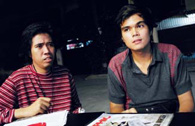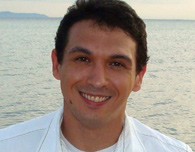Winton Lou Ynion, a gay doctoral student at the University of the Philippines at the time, was found dead with a knife was firmly planted in his skull on Aug.16, 2009. The 28-year-old was stabbed 40 times in the head, neck and chest by an unknown assailant in his condominium in Quezon City.
Five months earlier, the body of Vincent Jan Rubio, a 28-year-old gay film professor at La Salle College Antipolo, was found lying on a lawn wearing only a polo shirt and underwear. Local media reports say that Rubio might have been killed by two men who might have been “pick-ups”.

These are just two of 103 cases documented by Marlon Lacsamana and Reighben Earl Wystern Mendoza Labilles of the Philippine LGBT Hate Crime Watch. According to the duo who are conducting the online study and archiving reports of suspected LGBT-related killings, a total of 103 lesbian, gay, bisexual, and transgendered Filipinos have been killed since 1996 including 28 cases during the first half of 2011 alone. Of the 103, 61 were gay men, 26 were transgender, 12 were lesbian, and four were bisexuals. The Philippine LGBT Hate Crime Watch project, which operates via its blog and on Facebook, is supported by a coalition of individual advocates and organisations.
Lacsamana, 34, who is a librarian by profession was friends with both Ynion and Rubio, began to document the cases as he combed through the news archives of local papers after realising that no one was keeping track of suspected hate crimes in the country despite such cases happening with seeming regularity.
He told Fridae: “It’s personal for me, when I first lost a friend to an indescribable death in March of 2009, I cried and felt hopeless and helpless, and it happened again in September of the same year. I felt there is something to be done. Many LGBTs in the Philippines I know were being killed. And being a librarian, I started collecting the names of the LGBT individuals who were murdered.”
According to the report “A Database of Killed Lesbian, Gay, Bisexual and Transgendered Filipinos” that was released on Jun 17, the killers preferred to stab their LGBT victims to death. Thirty-eight of the 103 victims died from multiple stab wounds while 20 were shot. Six were tortured before they were killed. Others were raped, or killed with a blunt object, or suffocated, or dismembered, or burned alive. The study also showed that LGBTS who belonged to the 25 to 44 age group were most vulnerable, with 46 of 103 victims in this age range; and with most crimes happening in the Greater Manila Area.
The cases are based on news reports and personal accounts of people who knew the victims personally collected through email and Facebook.

Although the cases cannot be verified at this time, the researchers posit that the “brutalities done to the murdered LGBT Filipinos are also suggestive that they were victims of hate crime.” The authors of the report acknowledged in their report that the cases they have counted have yet to be cross checked with official police records due to the “lack of formal ties with law enforcement officials.” Neither does the police classify cases as (possible) hate crimes due to a lack of official policy.
Lacsamana says the group’s immediate goal is to create a secretariat to collect data, monitor and evaluate the incidence of killings, increase the public’s and government’s awareness of the issues and implement policies that will recognise, investigate, document, and prosecute hate crimes based on sexual orientation and gender identity.
He also cited difficulties when families of the gay victims did not want to reveal any information that might lead to the sexual orientation of the victims being known publicly, even if the victim was himself openly gay.
Download the “A Database of Killed Lesbian, Gay, Bisexual and Transgendered Filipinos” report (PDF).
